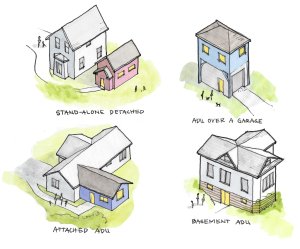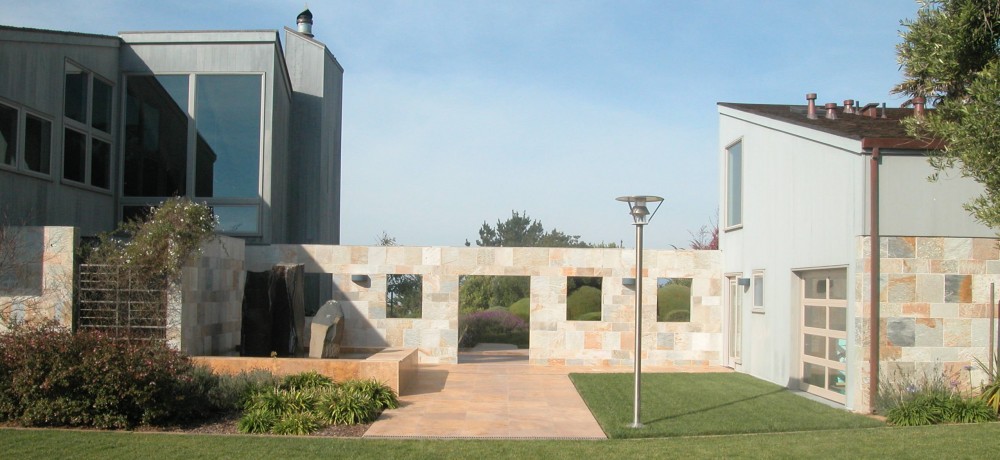 The State of California has a recognized housing shortage, with the result that both Sacramento and local municipalities throughout California have made myriad recent changes to the regulations governing ADUs. The upshot is that the City’s Planning Department has become more proactive in support of folks wanting to build ADUs, with the result that the associated rules and fees have become considerably more reasonable over the past several years. That said, if you are considering to build an ADU within the jurisdiction of the City of Santa Cruz it’s best to be well informed before embarking on your Project. Note that each local jurisdiction in the Monterey Bay area – Cities of Santa Cruz, Capitola, Watsonville, and Scotts Valley – each have their own, specific regulations: this article applies specifically to ADU regulations particular to the incorporated City of Santa Cruz.
The State of California has a recognized housing shortage, with the result that both Sacramento and local municipalities throughout California have made myriad recent changes to the regulations governing ADUs. The upshot is that the City’s Planning Department has become more proactive in support of folks wanting to build ADUs, with the result that the associated rules and fees have become considerably more reasonable over the past several years. That said, if you are considering to build an ADU within the jurisdiction of the City of Santa Cruz it’s best to be well informed before embarking on your Project. Note that each local jurisdiction in the Monterey Bay area – Cities of Santa Cruz, Capitola, Watsonville, and Scotts Valley – each have their own, specific regulations: this article applies specifically to ADU regulations particular to the incorporated City of Santa Cruz.
What is an ADU?
The City of Santa Cruz describes an ADU as a fully independent living unit with full facilities for sleeping, eating, cooking, and sanitation. They must have a full kitchen (minimum of countertop for food preparation, cooking appliance, space for refrigeration, and kitchen sink) and full bath (minimum toilet, sink, shower or bath). An ADU must have exterior access independent from the primary dwelling.
What is a JADU?
JADUs are allowed as part of an existing or proposed Single-Family home. An owner-occupied property with a single family home can have both one ADU and one JADU.JADUs can be created from an existing bedroom, or can be built as an addition to a home. A JADU can be as simple as adding a kitchenette and exterior entrance to an existing bedroom, or can be as complex as building an addition of a fully-contained studio apartment with full kitchen and bath facilities. JADUs are limited to no more than 500sf in size, and must have a minimum of the following features:
1. Attached to a single family home or townhome (must share a wall, ceiling, or floor with the primary Single-Family home on the parcel).
2. Exterior entrance separate from the entrance for the primary home.
3. Kitchenette with counter space, sink, storage cabinets, refrigerator, and space for appliances.
4. Internal access to a bathroom. (Bathroom and full kitchen facilities can either be shared with the rest of the home or be exclusive to the JADU.)
Current ADU Urgency Ordinance
New state laws governing ADUs went into effect on January 1, 2023, and Santa Cruz’s ADU regulations were immediately updated under an interim ordinance as a result. This temporary Urgency Ordinance will be replaced by a regular ordinance update at some point in 2023. The City has posted interim guidelines at its website. While the City undergoes the process of updating this information to accurately reflect the State’s current standards, it’s posted information should be read in tandem with the updates to the ADU Ordinances, recognizing that the Ordinances contains the most accurate information.
Permits For ADUs
Although all ADUs require a building permit, no discretionary approvals (i.e. those requiring public hearing or development permit processing) are required, and these permits cannot be challenged nor appealed by neighboring property owners. In the case of an ADU proposed as part of a larger project involving new construction or extensive renovations to an existing primary structure, additional permits may be required. If the proposed project involves a new single- or multi-family residential structure the City may delay approving the ADU application until permitting on the primary residential use has obtained approval. Additionally, certain ADUs in the Coastal Zone will require an Administrative Coastal Permit including notification of neighbors but without requirement for a public hearing.
ADU/JADU and Short-Term Rentals (STRs) Permits
Having both uses concurrently on the same property is prohibited by law at this time. Therefore, property owners exploring these options will need to determine whether to have a legal short-term vacation rental on their property or have an ADU or JADU for long-term residential purposes.
ADU Permit Fees
Building Permit fees for ADUs vary from between various Projects based on a number of variables. Examples include:
• type of construction: remodel vs. new structure
• type of construction: remodel of habitable space vs. remodel of non-habitable space
• the size of the ADU
• scope of project: adding new sidewalks, parking or paved areas, new water or sewer connections, etc.
For Further Reading:
• The California Department of Housing and Community Development’s overview of ADUs, JADUs, and funding incentives can be found at https://www.hcd.ca.gov/policy-and-research/accessory-dwelling-units
• AccessoryDwellings.org, a website dedicated to providing information and resources on ADUs, have a section specifically focused on CA including resources on ADU regulations, financing, and design. You can explore their California ADU resources at: https://accessorydwellings.org/category/california/
• The City of Santa Cruz’ ADU information page is at: https://www.cityofsantacruz.com/government/city-departments/planning-and-community-development/accessory-dwelling-units-adus
